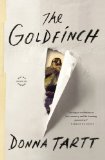Summary | Excerpt | Reviews | Beyond the Book | Readalikes | Genres & Themes | Author Bio

A Novel
by Donna Tartt
"I was only a mail-order model," she always took pains to explain to people—by which she meant she'd never done fashion magazines or couture, only circulars for chain stores, inexpensive casuals for junior misses in Missouri and Montana. Sometimes it was fun, she said, but mostly it wasn't: swimsuits in January, shivering from flu; tweeds and woolens in summer heat, sweltering for hours amid fake autumn leaves while a studio fan blew hot air and a guy from makeup darted in between takes to powder the sweat off her face.
But during those years of standing around and pretending to be in college—posing in mock campus settings in stiff pairs and threes, books clutched to her chest—she'd managed to sock away enough money to send herself to college for real: art history at NYU. She'd never seen a great painting in person until she was eighteen and moved to New York, and she was eager to make up for lost time—"pure bliss, perfect heaven," she'd said, up to the neck in art books and poring over the same old slides (Manet, Vuillard) until her vision started to blur. ("It's crazy," she'd said, "but I'd be perfectly happy if I could sit looking at the same half dozen paintings for the rest of my life. I can't think of a better way to go insane.")
College was the second important thing that had happened to her in New York—for her, probably the most important. And if not for the third thing (meeting and marrying my father—not so lucky as the first two) she would almost certainly have finished her master's and gone on for her PhD. Whenever she had a few hours to herself she always headed straight to the Frick, or MoMA, or the Met—which is why, as we stood under the dripping portico of the museum, gazing out across hazy Fifth Avenue and the raindrops jumping white in the street, I was not surprised when she shook her umbrella out and said: "Maybe we should go in and poke around for a bit till it stops."
"Um—" What I wanted was breakfast. "Sure."
She glanced at her watch. "Might as well. We're not going to get a cab in all this."
She was right. Still, I was starving. When are we going to eat? I thought grumpily, following her up the stairs. For all I knew, she was going to be so mad after the meeting she wouldn't take me out to lunch at all, I would have to go home and eat a bowl of cereal or something.
Yet the museum always felt like a holiday; and once we were inside with the glad roar of tourists all around us, I felt strangely insulated from whatever else the day might hold in store. The Great Hall was loud, and rank with the smell of wet overcoats. A drenched crowd of Asian senior citizens surged past, after a crisp stewardessy guide; bedraggled Girl Scouts huddled whispering near the coat check; beside the information desk stood a line of military-school cadets in gray dress uniforms, hats off, clasped hands behind their backs.
For me—a city kid, always confined by apartment walls—the museum was interesting mainly because of its immense size, a palace where the rooms went on forever and grew more and more deserted the farther in you went. Some of the neglected bedchambers and roped-off drawing rooms in the depths of European Decorating felt bound-up in deep enchantment, as if no one had set foot in them for hundreds of years. Ever since I'd started riding the train by myself I'd loved to go there alone and roam around until I got lost, wandering deeper and deeper in the maze of galleries until sometimes I found myself in forgotten halls of armor and porcelain that I'd never seen before (and, occasionally, was unable to find again).
As I hung behind my mother in the admissions line, I put my head back and stared fixedly into the cavernous ceiling dome two stories above: if I stared hard enough, sometimes I could make myself feel like I was floating around up there like a feather, a trick from early childhood that was fading as I got older.
Excerpted from The Goldfinch by Donna Tartt. Copyright © 2013 by Donna Tartt. Excerpted by permission of Little Brown & Company. All rights reserved. No part of this excerpt may be reproduced or reprinted without permission in writing from the publisher.
Your guide toexceptional books
BookBrowse seeks out and recommends the best in contemporary fiction and nonfiction—books that not only engage and entertain but also deepen our understanding of ourselves and the world around us.